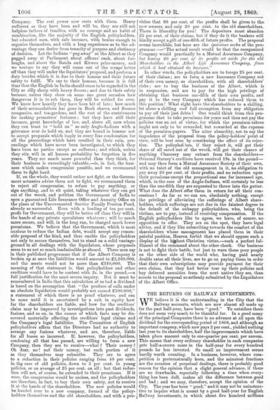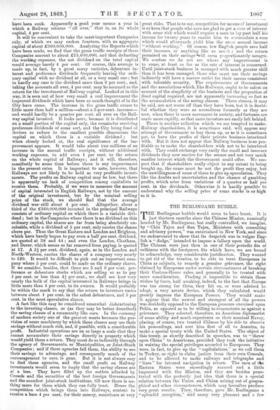THE RETURNS ON RAILWAY INVESTMENTS.
WE believe it is. the understanding in the City that the Railway accounts, which are now almost all made up, for the past half-year, have been "good." To outsiders there- does not seem very much to be thankful for. In a good many of the principal Companies there is no advance at all upon thern dividend for the corresponding period of 1868, and although an important company, which now pays 2 per cent., yielded nothing last year to its shareholders, half the improvements which have taken place amount only to one-quarter per cent. per annum. This means that every ordinary shareholder in such companies gets half-a-crown more in the half-year for every hundred pounds he has invested. So small an improvement seems- hardly worth counting. In a business, however, where com- petition is preternaturally keen, and the minutest fractions. are the occasion of perpetual dealings, there is probably good reason for the opinion that a slight general advance, if there are no drawbacks, especially following a time when every- thing has been dull, makes all the difference between good and bad ; and we may, therefore, accept the opinion of the City. The year has been "good," and it may not be uninstruc- tive to inquire what is meant by a good half-year for English Railway investments, in which about five hundred millions
have been sunk. Apparently a good year means a year in which a Railway returns "all over," that is, on its whole capital, 4 per cent.
It will be convenient to take the mostrimportant Companies only, of which we may reckon fourteen, with an aggregate capital of about £360,000,000. Analyzing the Reports which have been made, we find that the gross traffic receipts of these Companies amount to about £15,600,000, and that deducting the workiag expenses, the net dividend on the total capital would average barely 4 per cent. Of course, this average is made up, in fact, by a great many varieties, debenture in- terest and preference dividends frequently leaving the ordi- nary capital with no dividend at all, or a very small one ; but in hardly any case is the dividend more than 6 per cent., and, taking the accounts all over, 4 per cent. may be assumed as the return for the investment of Railway capital. Looked at in this way, it is seen out of how very small a real improvement the improved dividends which have been so much thought of in the City have come. The increase in the gross traffic comes to little more than half a million—about a 3-per-cent. increase-.-- and would hardly be a quarter per cent. all over on the Rail- way capital invested. It looks more, because it is distributed on a small portion of the capital only, the remainder receiving preference dividends of some sort, and the City being fond of devices to reduce to the smallest possible dimensions the capital on which there is a variable dividend ; but when closely looked at, the real significance of the im- provement appears. It would take about two millions of an increase in the annual traffic receipts, without additional working expenses, to add even 1 per cent. to the return on the whole capital of Railways ; and it will, therefore, manifestly be some time before there is any improvement in the present rates. It is important to note, however, that Railways are not likely to be held as very profitable invest- ments. The profits on Railway capital may be low, but there is apparently no lack of competition among capitalists to receive them. Probably, if we were to measure the amount of capital interested in English Railways, not by the amount of the original investment, but by the nominal selling price of the stock, we should find that the average dividend was- still about 4 per cent. Altogether, about a third of the £360,000,000 invested in the principal Railways consists of ordinary capital on which there is a variable divi- dend; but in the Companies where there is no dividend on this ordinary capital, the shares are far from being absolutely un- saleable, while a dividend of 5 per cent. only carries the shares above par. Thus the Great Eastern and London and Brighton, which have barely begun to pay even a half percent. dividend, are quoted at 38 and 44; and even the London, Chatham, and Dover, which seems 80 far removed from paying, is quoted at 17. A 51 per cent. dividend, again, as in the London and North-Western, carries the shares of a company very nearly to 120. It would be difficult to pick out an important com- pany where 5 per cent. could be made on the ordinary shares. If we consider, besides, that there are 5 and 6 per cent, pre- ference or debenture stocks which are selling so as to pay 4 per cent, or less than 41- per cent., we shall see how very nearly the bulk of the capital interested in Railways brings in little more than 4 per cent. to its owners. It would probably be within the mark to say that the return to investors varies between about 4 per cent. in the safest debentures, and 5 per cent. in the most speculative shares.
A fact like this may be considered somewhat disheartening to the investing classes, or (as they may be better described) the saving classes of a community like ours. In the economy of modern society one of the greatest wants becomes the pro- vision of some machinery by which these classes may use their savings without much risk, and, if possible, with a considerable profit. Industrial operations are on so large a scale that they cannot accumulate their savings directly in property which would yield them a return. They must do so indirectly through the agency of Governments, or Municipalities, or Joint-Stock Companies ; and if these agencies fail them, the ability to use their savings to advantage, and consequently much of the encouragement to save, is gone. But it is not always easy to find these agencies, and the small profit on Railway investments would seem to imply that the saving classes are at a loss. They have filled up the outlets afforded by Consols and the securities of the best foreign Governments and the soundest joint-stock institutions, till now there is no- thing more for them which they can fully trust. Hence the competition which brings them into Railways, content to receive a bare 4 per cent. for their money, sometimes at very great risks. That is to say, competition for means of investment is so keen that people who save are glad to get a rate of interest with some risk which would require a man to lay past half his income for twenty years to enable him to accumulate a sum which would afterwards yield him the same annual income "without working." Of course, few English people save half their incomes, or anything like so much ; and the return promised on their savings will seem proportionately meagre. We confess we do not see where any improvement is to come, at least so far as the rate of interest is concerned. Until joint-stock business is managed with much greater skill than it has been managed, those who must use their savings indirectly will have a narrow outlet for their means consistent with tolerable security. The requirements of Governments and the associations which, like Railways, ought to be safest on account of the simplicity of the business and the proportion of fixed capital required, are not apparently increasing so fast as the accumulation of the saving classes. These classes, it may be said, are not worse off than they have been, but it is doubt- ful whether they were so necessitous formerly as they are now, when there is more movement in society, and fortunes are made more rapidly, so that mere investors are easily left behind.
There is another reflection which we are tempted to make. Railway shareholders, it is sometimes said, will oppose any attempt of Government to buy them up, or as it is sometimes put, to have the profits of their private business interfered with. But it does not appear that Railway business is so pro- fitable as to make the shareholders wish not to be interfered with. They could exchange very easily the small and insecure dividends they now receive for the secure and not very much smaller interest which the Government could offer. We sus- pect that if shareholders really object to any extent to being bought up, the cause must be not the profit they enjoy, but the unwillingness of some of them to give up speculation. They like the doubts and uncertainties and the chance of gambling profits, which arise from variations of a quarter or half per- cent. in the dividends. Otherwise it is hardly possible to underatand why the selling price of some stocks is so high as it is.































 Previous page
Previous page